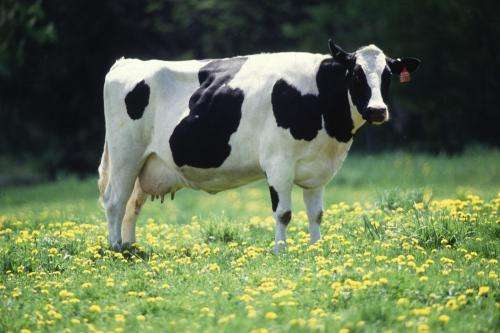Team researches future of climate smart dairy farming and bioenergy

Dartmouth and the University of Maryland have received federal funding to study the environmental and financial benefits of converting methane gas from cow manure into electricity and heat on Vermont and New York dairy farms over the next 60 years.
The project is part of the emerging global effort to secure sustainable sources of food, energy and water by using integrated food-energy systems (IFES), which combine food and energy production into one system. Led by Dartmouth Professor Anne Kapuscinski, the project builds on Dartmouth's work with the U.N. Food and Agriculture Organization to address the food-energy-climate nexus. The Dartmouth team of faculty and students from the Environmental Studies Program and the Thayer School of Engineering, as well as private sector practitioners, studies IFES cases around the world and conducts experimental research. The team has found a clear pattern in the rich diversity of emerging systems, which are organized around animal-driven, plant-driven or energy-driven production. The team, along with farm bioenergy experts, is now digging into measuring the broader benefits of animal-driven systems on dairy farms.
"Our research will generate new insights about an engineered system that is emerging around the world in which people intentionally integrate food and energy production in response to local conditions," Kapuscinski says. "The effects of this integration have not been fully examined, so we will help fill this gap by quantifying how it affects the present-day and longer-term financial viability and environmental impacts of farms."
The nearly $500,000 grant from the USDA's National Institute of Food and Agriculture is for two years, starting April 1.
Anaerobic digesters, which are one type of IFES, use a byproduct of cow manure called methane, which is a potent greenhouse gas, to produce electricity and heat for use on the farm. Anaerobic digesters can replace a large amount of fossil fuel, reduce methane greenhouse gas emissions, generate income through sales of electricity and other by-products and reduce surface and groundwater pollution and odors. But IFES's benefits may not outweigh the large investment and human capital costs from operating new technologies and developing new products. Farmers also face risks from shifting energy markets and regulations.
To understand how IFES affects farms under possible future policy, technological, social and environmental changes, this project will use an interdisciplinary team of environmental scientists, engineers, social scientists and practitioners to study 50 dairy farms in Vermont and New York. Some of the farms have adopted digesters, while other farms have not. The modeled results will be uploaded into an online database of IFES to support related collaborative research projects around the globe.
The team also will look at farms that have taken the typical digester technology even further by adding greenhouses, selling compost off-site and accepting waste from other businesses—what the researchers call "intensification." Examples of IFES intensification currently found on dairy farms in Vermont and New York include: importation of cheese, yogurt and food processing waste to enhance biogas production; capture of more waste heat for year-round greenhouse production of fresh vegetables sold to local markets; addition of centrifuges to improve separation of solids from liquids to produce marketable compost and animal bedding and liquid to be applied as fertilizer on cropland; and addition of windmills and solar photovoltaic systems to export additional renewable energy via the grid interconnect that was previously installed for the biodigester energy system.
In 2014, the team published the first framework of diverse IFES to show their global emergence and set the research agenda on important questions about their environmental, economic, and social effects.
Provided by Dartmouth College